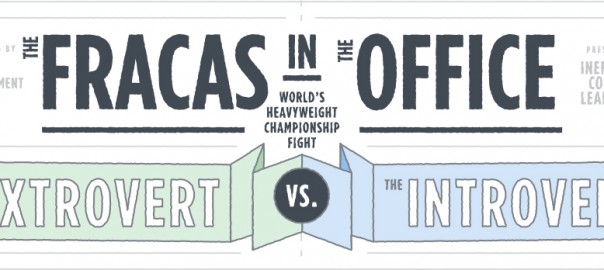
Meet Jeff
Jeff is the social butterfly of the office – truly, he gets along with everyone that steps through the front door every morning. When he walks into his cubicle Monday through Friday, he’s ready for those team projects as he is typically the leader. Jeff can make sure things are done well the first time around because he strives for efficiency. On the other hand, management has difficulty getting Jeff to “get to work” and he often distracts the team he’s trying to lead and takes on tasks not assigned to him. His manager decides to keep him focused and drowns him in tasks and keeps him working by himself from home. Jeff flounders and finds himself g-chatting all day with co-workers, and once again distracting them.
Meet Belinda
Belinda keeps to herself and while friendly to everyone, has no desire to join groups or lead teams. She communicates with the co-workers she needs to and prefers to send questions via email and stay close to her desk. A highly skilled contributor, she does well at many tasks, prompting a promotion to management who note her productivity. Once there, Belinda struggled to meet deadlines, and her coworkers reported not knowing what she needed from them. She gets incredibly frustrated at meetings and is unable to communicate why. Her team decides to “work around her” and this forces her to do mostly administrative and reporting tasks, a tragic waste of her talent.
As a Leader
Only 44% of employees say their company leadership is effective at leading the organization to success. Unfortunately, only about 40% of employees agree that their company facilitates easy collaboration – an even smaller 37% agree their organization is dedicated to diversity. Belinda isn’t suited to leading collaboration unless it’s primarily a remote team and the management “social” needs imposed on her will frustrate her and sap productivity. Your Jeffs need opportunities for growth and mentorship with coaching to curb their enthusiasm. Not to mention their ability to clearly understand those around them, they are suitable to handling diversity initiatives. Banning Jeff to a remote workspace will create more hurdles for him to overcome and frustrate him and team members since he thrives on face to face connections.
As a Team Member
Belinda needs to be valued for her contributions as well as the personality type that allows her to be so productive. Belindas will rarely crow about their achievements and it can be easy for other team members to overlook her contributions to the company goals. Managers should highlight her contributions to more extroverted team members. Give Belinda the opportunity to report progress via a project management system. On the other hand, Jeff has the verbal, auditory, decision-making, and problem-solving skills necessary to solve underlying problems that can cause disturbances in communication. Surprisingly, only 27% of employees get training in workplace communication and only 18% are evaluated on their communication skills during performance reviews. Ensure that Jeff is heard and understands how to share his points briefly and quickly. Privately, coach him on recognizing other contributions on his team and steer him toward strategic work that requires client interaction.
How do You Manage Jeff and Belinda?
The social traits of your Jeff instills a sense of confidence and is therefore more likely to pursue opportunities for advancement within the company. They thrive on coaching, due to their desire for growth, so this is an opportunity for your managers to impart their knowledge on the budding leaders. In fact, nearly 66% of CEOs don’t get coaching or leadership guidance before they reach their leadership positions. What better way to prepare your leadership pipeline than with grooming from current executives? Sherrie Scott, freelance writer for Demand Media, said:
“Workers with sociability characteristics are more likely to receive promotions because these individuals are dependable and take responsibility for their actions. They handle stressful situations effectively, which is ideal when taking on added responsibilities.”
Belinda would prefer to get feedback via a performance management system and know exactly what specific things you need her to change about her approach. Teach her to respond clearly to each request her team sends and to create unassailable email rules for herself. While it’s not her preferred method of communication, Belinda should be encouraged to speak up at meetings where her contributions should be highlighted and management can start this for her by pointing out specific things and asking her to elaborate. Pair Belinda with remote workers and allow work-from-home hours if possible.
Sign up for Vitru Compare today for free to see how your teams work well together, how to coach employees and different types and how to form your next great team with personality assessments.
(215)





